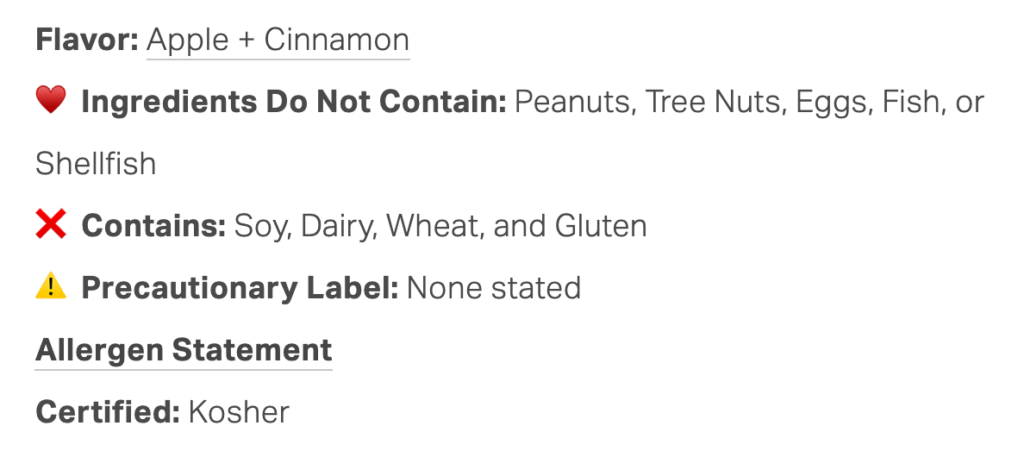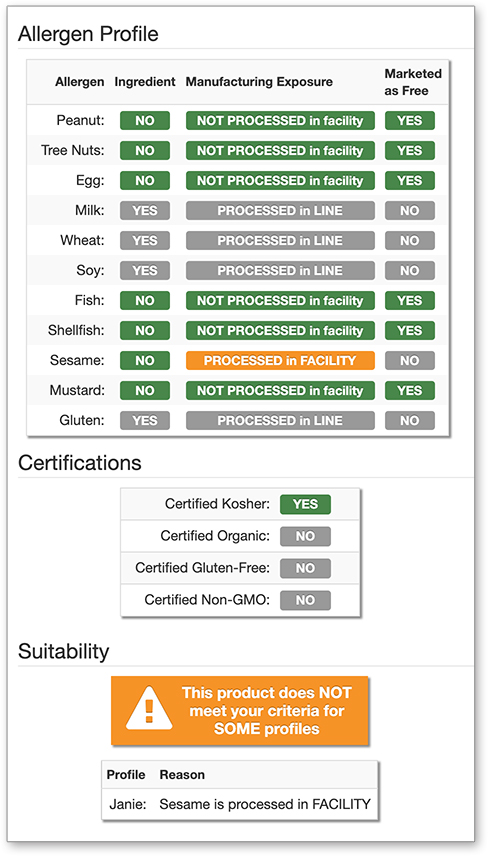By now you might have seen Susie Hultquist’s appearance on Entrepreneur Elevator Pitch, a webcast similar to the popular ABC series Shark Tank. Susie is the founder of Spokin, a food allergy app, who appeared on the show to solicit funding and exposure for her venture.
Susie is a smart business person with an eye for promotion, so I was not surprised to see she had scored a coup by landing a spot on the program. That said, her “elevator pitch” and the subsequent followup dialog with the show’s hosts left me with a number of concerns.
Susie opens her pitch explaining that her daughter has food allergies and that, “ferreting out whether cookies are safe can take you 15 minutes. Over the course of a lifetime, this adds up to one full year of your life.” For the average food allergy family, that means spending time calling manufacturers to find out whether there’s a possibility of cross-contact with allergens, information that is often not provided on the label or the company’s website.
To help, Spokin publishes a number of allergy-friendly product guides. During the show, Susie described the response to their granola bar guide:
We found companies calling us saying “You’re actually driving revenues to my company… who are you?” So we would do an allergy friendly granola bar guide and these granola bar companies were calling us saying “Who are you? We don’t know who you are!”
It’s hard to imagine how Spokin is able to recommend products as allergy-friendly without first diving into the details of how they are manufactured with their respective manufacturers, something the average food allergy parent does. That appears not to be a part of their vetting process, otherwise the manufacturers of those products would know who they are.
Here’s an example of the information provided in one of their granola bar recommendations:

You might assume Spokin has done due-diligence behind the scenes to save that call to the manufacturer, but this is information simply gleaned from the label. If you look closely at their wording, there is no indication whether this product is made on shared lines with peanuts, tree nuts, eggs, fish, or shellfish. In fact, this particular manufacturer won’t disclose that information due to their company policy.
As a result of years working with food manufacturers and learning how companies make the decision whether to place voluntary “may contain” type statements on their packaging, we believe relying on the label alone is a dangerous practice. In fact, that practice is what ultimately led to the demise of another food allergy app — ContentChecked — once they lost the confidence of their users.
Why didn’t Spokin spend the time “ferreting out whether this product is safe?” A subsequent article in Built in Chicago explains:
On its new platform that likely will roll out in November, companies can pay to have their brand names “verified,” meaning they’ve confirmed the allergen information displayed on the app. These companies will also have first dibs on product features and campaigns that use customers’ data to serve up targeted content.
Which begs the question: Why would Spokin provide the unverified information to the food allergy community in the first place and why is the community entitled to the verified information only if the manufacturer pays?
In contrast, our Allergence screening service has been providing product suggestions tailored to each family’s allergen restrictions since 2014. We partner with over 120 manufacturers that disclose to us precisely how they process the 11 allergens we track for over 2000 products, including shared line and facility information and we do that at no cost to the manufacturer or consumer.
We know how each product is made because the manufacturer must agree to disclose their processes BEFORE we recommend their products. We then provide that information to the community via Allergence in an easy to understand format:

That explains our concern with their data. But just as disconcerting is the breadth of the user information Spokin collects via their app and the ambiguity behind how they plan to monetize your data.
Toward the conclusion of her 60-second pitch, Susie states: “We capture valuable consumer data that a wide range of industries can use to market directly to the consumer.”
The hosts followed with this conversation amongst themselves:
Host 1: “I’m not sure the revenue model is going to drive it.”
Host 2: “Also, I think it’s selling data…”
Host 3: “Or it could be ads.”
Host 4: “It would have been nice if she would have said any of that!”
Later, Susie elaborated on the business model behind Spokin:
I think we are the most uniquely positioned platform to help companies market. When users sign up on our app we know up to 80 allergens what they’re allergic to, we know their age, their gender, we know where they live. On our app, we know their behavior, what they share, what they search, and what they save. So allergy companies who need to drive their awareness, and they want to demonstrate an awareness to this community and keep them safe and actually make a business out of it, they have nowhere else to go but us.
Nothing in the video makes clear whether Spokin intends to monetize this treasure trove of users’ data by selling it to third parties, but the prospect of having that personal information in the hands of a “wide range of industries” is alarming. Aside from standard privacy concerns, each user of their app either has a pre-existing condition or cares for someone that does. Access to that information would be devastating if it were ever sold or shared with third parties, especially in a future when insurers might no longer be required to cover pre-existing conditions.
I’ll step up and pledge that SnackSafely.com never has and never will sell or otherwise share your personal data. Period. Full-stop. That’s an easy pledge for us to make because we answer to no one but the food allergy community.
Spokin is already beholden to investors for $3 million and is looking to raise significantly more, and with increasing outside investment comes increasing pressure to produce increasing returns. It is unknown whether Spokin will ever be able to generate enough ad revenue to satisfy their investors, but if not, they’ll be looking for additional ways to monetize their primary asset: user data.
To dispel the ambiguity left by the video, I call on Spokin — as well as others that serve the community — to step forward and make a similar pledge never to sell or share their users’ personal data regardless of business model or pressure from investors.
We admire Susie, her company and investors for the breadth of their ambitions but urge them to make clear that satisfying those ambitions will never come at the expense of the privacy and safety of the food allergy community.
Dave Bloom
CEO SnackSafely.com





